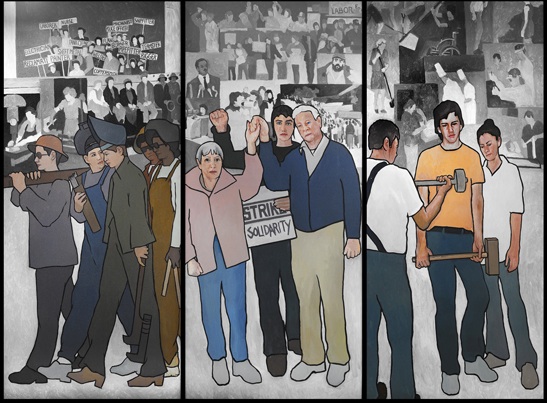The long battle over the now-famous labor mural that hung in a state office building in Augusta appeared to come to its end Wednesday.
A federal appeals court in Boston affirmed an earlier ruling that Gov. Paul LePage was within his rights to remove the 11-panel, 7-foot-tall mural from the Department of Labor’s waiting room because the removal constituted “government speech.”
Not long after he was inaugurated in January 2011, the governor criticized the mural, which depicted scenes of Maine’s labor history, as a one-sided view sympathetic to unions. He compared it at one point to communist propaganda in North Korea.
LePage has clashed often with the state’s largest public employee unions, and some felt the mural’s removal was meant to send a message them.
Several hundred people protested at the building after learning of the governor’s plans. The mural was taken down quietly over a weekend and stored in an undisclosed location.
Five Mainers, including three artists, later filed a lawsuit claiming the removal violated the First Amendment rights of the mural’s artist, Judy Taylor of Blue Hill.
The case made its way through federal court in Maine, where U.S. District Judge John Woodcock Jr. sided with LePage. The case was then sent to the U.S. 1st Circuit Court of Appeals in Boston.
The Associated Press reported that in Wednesday’s ruling, Chief Judge Sandra Lynch suggested that critics of the labor mural’s removal can show their displeasure in other ways, including at the ballot box.
“There are those who disagree with the decision to remove the mural from the (Maine Department of Labor). Governors and administrations are ultimately accountable to the electorate through the political process, which is the mechanism to test disagreements,” Lynch wrote.
Adrienne Bennett, the governor’s spokeswoman, said his office did not want to comment Wednesday night.
The plaintiffs wanted the mural case to be sent back to U.S. District Court in Maine for a jury trial. It wasn’t immediately clear whether the group will continue with appeals.
“It is a sad day for all of us when our precious First Amendment freedom of speech is eroded and censorship prevails,” said Jeff Young, an attorney for the plaintiffs. “(We) are particularly disappointed that after 18 months of litigation, the First Circuit’s decision is premised upon a theory that none of the parties ever had briefed and that was not considered by the District of Maine.
“Nevertheless, we are comforted by the fact that despite this loss in the court of law, the court of public opinion has reached a different conclusion,” Young said, referring to Election Day.
Democrats this month regained majorities in the House and Senate, which had been controlled by Republicans since LePage’s election. Some viewed the shift as an indictment of LePage, who is not up for re-election until 2014.
The mural, featuring World War II’s “Rosie the Riveter,” a 1937 shoe strike in Maine and New Deal-era U.S. Labor Secretary Frances Perkins, was commissioned by Democratic Gov. John Baldacci and created at a cost of $60,000.
A full-size replica has been displayed in Maine, but the location of the original has been a mystery ever since its removal. The LePage administration has not disclosed its whereabouts.
Young called on the governor to “keep his word and to now display the mural in an appropriate state building, such as the Maine State Museum, where people can learn about the men and women who have labored to build our great state.”
During oral arguments earlier this month, Lynch said the mural was neither part of the state’s public art program nor a private donation. She noted that the mural was purchased under a contract that gave the artist limited rights
In support of their argument, lawyers for the plaintiffs contended that the government did not effectively control the message of the artwork.
They noted, among other things, that the committee that selected Taylor instructed her on the subject matter but not the message, and that her contract confirmed her independence in its creation.
Maine Deputy Attorney General Paul Stern argued before the three-judge appeals panel that the plaintiffs weren’t actually fighting for free speech.
“What they want is the speech they like to be there as long as possible,” Stern said. “To say the First Amendment requires the state of Maine — and the Department of Labor — to have this mural there forever is wrong.”
— The Associated Press contributed to this story.
Staff Writer Eric Russell can be reached at 791-6344 or at:
erussell@pressherald.com
Twitter: @PPHEricRussel
Send questions/comments to the editors.




Success. Please wait for the page to reload. If the page does not reload within 5 seconds, please refresh the page.
Enter your email and password to access comments.
Hi, to comment on stories you must . This profile is in addition to your subscription and website login.
Already have a commenting profile? .
Invalid username/password.
Please check your email to confirm and complete your registration.
Only subscribers are eligible to post comments. Please subscribe or login first for digital access. Here’s why.
Use the form below to reset your password. When you've submitted your account email, we will send an email with a reset code.